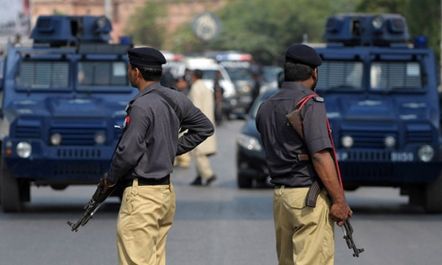Fear, Crime, Silence: Sindh’s Hidden Order

The scale of criminal activity has expanded so rapidly that the public no longer feels safe even in daylight
By Prof. Dr. Abdullah Arijo
Once celebrated for its culture of tolerance, music, and mysticism, Sindh today stands at a troubling crossroads. The province, known as the cradle of Sufism and home to centuries-old traditions of coexistence, is now overshadowed by fear, lawlessness, and despair. From the streets of Karachi to the riverine belt of upper Sindh, the daily news has become a grim catalogue of dacoities, street crimes, and abductions.
The scale of criminal activity has expanded so rapidly that the public no longer feels safe even in daylight. Street robberies, home invasions, and highway hold-ups have become so routine that they barely make headlines anymore. Meanwhile, the state machinery, already stretched and compromised, seems unable, or unwilling, to respond effectively.
A Province Gripped by Fear
Sindh’s crime wave is not confined to a few localities. Urban centers like Karachi, Hyderabad, and Sukkur have seen an alarming rise in street crimes, while the rural regions, particularly the kacha (Riverine) areas along the Indus River, are once again becoming safe havens for armed gangs. Ordinary citizens live under a cloud of anxiety, forced to calculate every step outside their homes.
The social cost of this pervasive fear is immense. Businesses shut down early, public spaces grow empty after sunset, and residents have learned to keep their heads low and their hopes lower. For many, survival has become an everyday negotiation with uncertainty.
Root Causes: Economic Despair and Institutional Collapse
The current state of lawlessness is not a sudden development; it is the cumulative result of years of neglect, poor governance, and misplaced priorities. At its heart lies the province’s deepening economic crisis. Rampant unemployment, rising inflation, and a lack of opportunities have pushed a growing number of young people to the brink of desperation. When legitimate avenues for earning collapse, illegitimate ones inevitably flourish.
Equally damaging is the collapse of policing and justice systems. The police force, long marred by corruption and political interference, has lost its ability to act as an impartial guardian of public safety. Transfers and postings often depend on political connections rather than merit, turning law enforcement into a tool of influence rather than justice.
For many citizens, filing a First Information Report (FIR) itself is an ordeal. Victims are frequently dissuaded or threatened, while perpetrators, often backed by political patrons, roam free. Such experiences erode public faith in institutions and breed a culture of impunity.
The Return of the Dacoit Culture
Rural Sindh, particularly the riverine kacha regions, has witnessed the resurgence of a phenomenon many thought consigned to history:
The dacoit culture. Bandits, often heavily armed and well-connected, control pockets of territory where state authority is almost symbolic. Kidnapping for ransom has become a lucrative industry, with reports suggesting that in some cases, local officials turn a blind eye or worse, collaborate.
Periodic “operations” are launched with fanfare, but they rarely yield meaningful results. Once the cameras are gone, the problem resurfaces. For residents, the message is clear: they are on their own. This absence of effective governance not only undermines security but also deepens the divide between the state and its citizens.
Urban Nightmare: Karachi and Beyond
In urban Sindh, particularly Karachi, the situation is equally dire. The city that once powered Pakistan’s economy has become a theatre of daily robberies and assaults. Street crimes are rampant, with mobiles, wallets, and motorbikes snatched at gunpoint, and are now part of the city’s daily routine.
For every reported case, several others go unrecorded, either out of fear or futility. Many victims believe reporting a crime is a waste of time; others fear harassment by the very authorities meant to protect them. The psychological toll is evident: Karachiites have grown numb to violence, adapting to survival as if it were a civic duty.
The State’s Shrinking Authority
The alarming rise in crime across Sindh signals more than just a policing failure—it reflects a crisis of governance and moral authority. The state appears increasingly absent from the everyday life of its citizens. Where laws exist, enforcement is selective; where justice is promised, it is delayed or denied.
This vacuum has allowed non-state actors, tribal networks, political militias, and criminal syndicates to fill the void. The thin line between politics and crime has blurred, creating a hybrid order in which power is negotiated through fear and patronage rather than law and accountability.
Worse still, public silence has become complicity. Citizens, frustrated and fearful, have retreated into private survival, choosing endurance over resistance. Yet such silence only emboldens the powerful and normalizes the breakdown of order.
What Can Be Done?
Sindh’s slide into lawlessness is reversible, but only through serious structural reforms and political will. Cosmetic measures, press conferences, and temporary crackdowns are no substitute for sustained change.
- Depoliticize the police. Merit-based appointments, professional autonomy, and strict accountability must replace political interference.
- Empower local governance. Municipal and district-level mechanisms should be strengthened to address security and development issues simultaneously.
- Invest in youth and employment. Without economic inclusion, no amount of policing can stem the tide of desperation-driven crime.
- Ensure swift and transparent justice. Courts must prioritize cases involving violent crime, and punishments must be timely and visible to restore deterrence.
- Rebuild public trust. The government must engage civil society, community leaders, and media to promote awareness, responsibility, and vigilance at the grassroots level.
A Province at the Crossroads
Sindh’s story today is one of tragic irony: a land that once preached peace is now pleading for safety. The cries of victims, the frustration of honest officers, and the helplessness of citizens all point to a single truth: the social contract is breaking.
If the state continues to treat law and order as a seasonal issue rather than a foundational one, Sindh’s descent into chaos will only deepen. The province cannot afford to let crime dictate its destiny.
History reminds us that no civilization thrives in fear. Sindh, the land of saints and poets, deserves better than this suffocating uncertainty. It deserves leadership that restores not just law, but also hope, the belief that justice, order, and dignity are still possible.
Until that happens, the people of Sindh will continue to live as prisoners of fear, waiting for the dawn of a safer tomorrow that seems, for now, painfully distant.
Read: The Afghan Refugees in Sindh
____________________
 Abdullah Arijo is a professor and curriculum architect at Sindh Agriculture University, Tandojam, specializing in Parasitology, fisheries, aquaculture, zoology, and environmental sciences. He is also a civic advocate for climate resilience and sustainable development.
Abdullah Arijo is a professor and curriculum architect at Sindh Agriculture University, Tandojam, specializing in Parasitology, fisheries, aquaculture, zoology, and environmental sciences. He is also a civic advocate for climate resilience and sustainable development.




